Become a Creator today!Start creating today - Share your story with the world!
Start for free
00:00:00
00:00:01
![[Re-release] Historical Mystery (part 2) image](https://media.zencastr.com/cdn-cgi/image/width=54,quality=85/image-files/61e1c276e3ec42007857cff9/ca62f9f1-327e-43bf-af6e-ba16ace5cc1a.jpg)
[Re-release] Historical Mystery (part 2)
Clued in Mystery is taking a short break. While we are off, we are re-releasing some of our favourite episodes from Season 3. This week, Historical Mystery part 2 with Sara Rosett. This episode originally released September 20, 2022.
About Sara
Sara Rosett is the USA Today bestselling author of over 30 cozy and historical mysteries as well as books and courses for writers including “How to Write a Series” and “How to Outline a Cozy Mystery”. She also hosts a podcast for readers, Mystery Books Podcast.
SaraRosett.com
Mystery Books Podcast
For more information: https://www.cluedinmystery.com
Instagram: @cluedinmystery
Contact us: hello@cluedinmystery.com
Music: Signs To Nowhere by Shane Ivers – www.silvermansound.com
Transcript
Introduction and Season Two Highlights
00:00:01
Speaker
Clued in Mystery is taking a short break. Until we return, we are re-releasing a few of our favorite episodes from season two. We hope you enjoy.
Guest Introduction: Sarah Rosette
00:00:24
Speaker
Welcome to Clued in Mystery. I'm Sarah.
00:00:28
Speaker
And I'm Brooke and we both love mystery. So Brooke, we've got another very exciting episode today. I'm so thrilled that we are talking with Sarah Rosette. I know this is going to be so much fun.
00:00:42
Speaker
somebody we really look up to in the mystery space. So I will give just a little background on Sarah before we get started today. Sarah Rosette is the USA bestselling author of over 30 cozy and historical mysteries, as well as books and courses for writers, including how to write a series and how to outline a cozy mystery. She also hosts a podcast for readers, mystery books podcast.
00:01:09
Speaker
And Sarah doesn't know this, but I consider her one of my mentors. We live in this great time where it's possible to learn. It's possible to learn from people with, through their podcasts and blogs and books, and they become a teacher to us. And sometimes they, well, most times they don't even know it.
00:01:28
Speaker
And I always find Sarah to be so supportive and a positive voice in the mystery space. And so thank you, Sarah. And I know that my friend Sarah also feels the same way. And we just want to welcome you to the podcast. Welcome to Clued in Mystery.
00:01:46
Speaker
Oh, well, thank you so much. That's so sweet of you to say that. And it is interesting because, you know, you send your books and your stories out in the world and you just don't know sometimes if they're having a big impact or not or small impact. But anyway, I'm so happy to hear that. You've made my day. Good.
00:02:04
Speaker
So yeah, thank you for that introduction Brooke. And yeah, welcome Sarah, really excited to chat with you today.
What Do Readers Seek in Historical Mysteries?
00:02:11
Speaker
So let's get started. So you write cozy mysteries, travel mysteries, and historical mysteries. What, if anything, are readers looking for in historical mysteries that they don't find in other types of mysteries?
00:02:27
Speaker
I think when people read, they generally want an escape. But I think for historical readers, they want to immerse themselves in this
00:02:38
Speaker
Unusual place like something that they're they can't visit today except through like movies or books And so I think they want to feel like they're in another time in another place And I think that they just love the details that you can include You know this like there's the fine balance between including too much and not enough but you want enough that the reader gets a sense of what that time was like what it was like, you know
00:03:06
Speaker
just day-to-day living, like what they ate, what kind of cars they drove, or carriages they rode in, or whatever period you're riding in. I think that's what they want. They want that escape. And I think that as our world becomes more technologically immersed, like everything we do online or on a screen, I think some people really want that escape to a time when there wasn't
00:03:31
Speaker
you know, social media, 24-hour news cycles and all those things like that. I think they want something that's very different. Sort of like if some people like sci-fi because they want to escape to a completely different world, this is kind of the same thing, but going back in time. Yeah, I hadn't thought about that connection between sci-fi and historical mystery, but I think you're right that there's that just desire to be somewhere else for a moment, right? Yeah, I think so, yeah.
00:04:02
Speaker
So what do you think is essential to historical mystery other than historical setting and mystery? So you mentioned in your previous answer about detail.
00:04:16
Speaker
Yeah, yeah, I think that you have to capture the place like the physical surroundings and then I think you need to also include like the dialogue when you're writing you've got to think about like what how people spoke and Like a Regency mystery probably has a much more formal dialogue than I'm writing 1920s So, you know
00:04:42
Speaker
1920s is much more casual, but even that's more formal than like a cozy, contemporary cozy would be today. So you've got to catch that dialogue and those phrases that people use and kind of the slang of the period if they have it, you know, if you can find out what it would be. And then I think
00:04:59
Speaker
People like reading about details, like things that are, as a historical reader myself, I enjoy reading about things and I learn a little something about the culture of the time. I think it's interesting if you go, oh, I didn't know they did.
00:05:15
Speaker
that they use this for medicine or that they travel this way. I don't get to travel on trains in the Golden Age of travel. I would love to do that or a steamship. So you kind of get to vicariously experience that. So I think that's important to readers. They want to feel that uniqueness to that time.
The Importance of Historical Accuracy
00:05:36
Speaker
And so can you tell us a little bit about that research process for you? Do you do that research before you start writing the book or the series? And how important is it to you to be historically accurate?
00:05:55
Speaker
Well, I always try to be historically accurate, but there are a lot of details, and sometimes people find something that's not perfectly right, and they have to go fix it. But I do try to do... I love research, and so I try to do as much research as I can before I start. But there's always those things that when you get into the book, you're like, oh, no. Do they have...
00:06:18
Speaker
Did cars have windshield wipers in the 1920s? I think so, but you have to go find it. Or like how they started their cars and a lot of them had cranks. So the more detail you get into your story, the more you're like, Oh, a lot of times it's motions and things I have people doing. I'm like, Oh, did they have medicine cabinets in the 1920s? I think so, but I don't know. I better check. And you know, just different things like that. So I do a lot of.
00:06:43
Speaker
I read a lot of books from the 1920s because I love that time period anyway. So just like reading fiction from the 1920s kind of helps you or helps me kind of see how it was written about then. And so it gives like a cultural kind of overview of what they had back then and how they lived. And then I read lots of biographies. I love to read biographies. And the other thing I've found really useful are travel guides that were published in like the
00:07:11
Speaker
You know like 1915 to 1925 if I could find something around then and it gives you all these amazing details that I could spend hours searching for on the internet and not be able to find like train schedules and Descriptions of the tours of like oh if you're going to this city You probably want to go see these things and then it'll describe you know have maps which I love I love maps It's another thing I love for research. So yeah, I just I could spend
00:07:39
Speaker
almost all my time researching. So I kind of have to stop and say, all right, that's enough. Now we need to start actually writing the book.
Balancing Detail and Story Flow
00:07:51
Speaker
And how do you, you kind of referred to this or alluded to this earlier about balancing how much detail to put in and moving the story along. So how do you, how do you find that balance?
00:08:07
Speaker
Well, I try to like drop little bits of information in and not put too much in. And sometimes I'll just have an allusion to something like just a brief mention and then
00:08:20
Speaker
Sometimes I'll have a character there who doesn't understand what's going on or something that's new and I can explain, you know, like my character can explain it. The main character can explain it to the other character, thus explaining it to the reader. But I try not to do that because you don't want to have too many of those, you know, as you know, blah, blah, blah. That's that's kind of slows everything down. So I try and figure out if it's going to slow down the story.
00:08:43
Speaker
I probably need to take it out. And I need to always, readers are really smart. And I have a tendency to think, like when I'm reading, I get impatient when people start explaining too much. I'm like, I get it, I get it. You don't have to explain, you know, from dialogue, I understand what's going on. So I try and keep that in mind and just include enough that I give readers a little taste of, you know, what the building was like, or, you know, I don't have to describe the whole
00:09:12
Speaker
art deco building that Olive lives in. I can just say it had a modern elevator and that meant there was no bellboy. That was one of the new things in the 1920s. They had the push button elevator thing and that was like, some people hated it, some people loved it. So just a little snippet of information like that is enough to help people kind of contextualize what's going on.
Trends in Historical Mystery Settings
00:09:36
Speaker
So have you seen a shift in terms of what is popular in historical mysteries?
00:09:42
Speaker
Yeah, I think that there seems like certain time periods kind of go up and down in popularity. So I think maybe 10, 20 years ago the Victorian era was really, really popular and almost most of the books that I saw were set, most historical mysteries were set kind of around that time period, that time. Now I feel like World War II and the 1920s are really popular.
00:10:08
Speaker
Interesting. Yeah, I think the 1920s is on an upswing, so I don't know how long it will last, but I've noticed more and more authors are writing in that era, and I don't know if it's...
00:10:23
Speaker
They say the further you get away from a certain time period, then you're able to write about it and people look back on it. I think that the 20s, 30s, 40s, and 50s were in that era right now. People are looking back and comparing that to today and there's a lot of parallels. The 1920s were like so much going on, so much change, a lot of
00:10:50
Speaker
societal tensions, you know, things like that that we kind of see mirrored in our world. And so it's kind of nice to look back to a different time and see how people negotiated that then. It kind of lets you reflect on what's going on now, but in a very subtle way.
00:11:04
Speaker
know. Just thinking about what you were saying about the push button elevators and the no bell boys. Bell boys, sorry. And the no bell boys. In my apartment building, they're upgrading the elevators and they're putting in touch screen elevators and it's the same thing. The residents are
00:11:26
Speaker
It's super interesting. The more things change, the more they stay the same, right? Totally, totally. A hundred years ago, changes in elevator technology were frustrating residents and it's still happening today. I think that parallel is really interesting.
00:11:51
Speaker
Yeah, thinking about 100 years ago, I guess, seems far away, but maybe not as far away as Victorian, right? You might have a grandparent who was alive in the 1920s. You're really unlikely to have a grandparent who was alive in Victorian times, right?
00:12:16
Speaker
I think that there are certain eras that I don't know that I could write in. I don't think I could do medieval. There's also mystery novels set in ancient Greece, Rome, and I can't wrap my mind around that time, so it's easier for me to write about something that's much closer, but some people love going way back.
00:12:40
Speaker
So what about your reading? Do you prefer to read historical mysteries set in the same time that you write in, or do you find yourself reading in other time periods?
00:12:55
Speaker
I tend to gravitate to the twenties, thirties, forties time period. And I think that started because I started reading like Agatha Christie and Dorothy Sayers. And I think, you know, I read a bunch of those books and I was like, Oh, and there's all these books by modern writers set in that same time period. So I kind of bounced back and forth between, you know, like classic golden age authors in kind of the modern version of that too.
Character Development in Historical Mysteries
00:13:21
Speaker
So that's what I like. And although I am seeing more and more books set in like the 50s, 60s, I'm seeing a couple of those and I'm like, maybe that's where things are going, but I'm more drawn to the 20s, 30s, 40s.
00:13:38
Speaker
Brooke and I talked about Golden Age mysteries and some people referring to them as historical mysteries when that really technically wouldn't be the definition.
00:13:53
Speaker
But yeah, I like, like you, I like reading the kind of original source material books that were written in that time period as well as contemporary books that are written now that are set in that time period.
00:14:09
Speaker
When you're reading those, Sarah, can you tell, if you say blind reading, you didn't know who had written the book, do you think you could tell if it was something that was written in the 20s or something that was written now and set in the 20s?
00:14:26
Speaker
I think the main difference is that the books that were actually written in the twenties and thirties, they really don't have a whole lot of description about like daily life or, you know, things that we might drop in to clarify for readers. I mean, like they don't really usually mention the cars or the, the train travel assist, you know, it's like I would take time to describe like the interior of a train carriage, not in huge detail, but I would mention like the,
00:14:57
Speaker
the veneer on the wood, because that's unusual for today. But I don't think they would do that then. And I don't see a lot of description about their world, whereas I would definitely include some of that, because I think that's what my readers want. So I think that's the main difference. And then character development, I think, is the other differences.
00:15:18
Speaker
like you had like Perot, Ms. Marple, they're much more like a flat arched character where they have like little like they're episodic and they don't change a whole lot but I think modern readers like more of an arc for their main character. They like their sleuth to gradually change
00:15:36
Speaker
maybe not dramatically, but kind of gradually change. So I think that's the other big difference because like Ms. Marple, she gets older, but she doesn't have like this huge arc where she's a completely different, you know, gone through a transformation, you know, the hero's journey. She doesn't do that. So I think that's the other differences the modern reader likes.
00:16:00
Speaker
a little bit more, uh, change in the character and a little, maybe a little bit more depth and background as well. Cause we don't know a lot about like Ms. Markle's background and Faroe's background. Yeah. That's interesting. I wonder if someone were to really try and mirror that lack of detail, lack of character depth, how that would be received now versus how those kind of original stories are, are received.
00:16:27
Speaker
Yeah, I don't know. I don't know if it would go over or not. I guess I should say that like, I think Dorothy Sayers is the exception to the depth of character because like, Whimsy does change throughout the series and he has a family and, you know, all these relatives and a bunch of stuff, backstory behind him that you do learn as the series goes on. But I think most readers, and I think maybe that's why I'm drawn to
00:16:56
Speaker
some of the Dorothy Sayers books. I was like, oh, when the first one I read, I was like, oh, I have to read the rest of these because this is a little bit different from the other Golden Age books that I had read at that point. So yeah, I think that modern readers prefer a little bit more kind of depth to the character. Whereas maybe the Golden Age readers, they really wanted that puzzle. And if you had a great puzzle, you were set.
00:17:26
Speaker
What I was just going to mention, I think their lack of detail for the story set in that time period is similar to what, if you were writing a contemporary mystery set into date, we would tend to do the same thing, right?
Challenges for Modern Writers
00:17:41
Speaker
We'd say, you know, he went out and he got in his car and we wouldn't put all those details in because we just take it for granted that everybody understands what we mean. But somebody in the future who wants to write
00:17:54
Speaker
historic about 2020 is going to have to throw in the touchscreen elevator, Sarah, or, you know, some of those things so that someone can place them in the time period. So it's just it's fascinating for me to think about the layering, you know, that happens when you
00:18:15
Speaker
with your harkening back and writing historical fiction the way you have to do that so that everyone gets your drift. But no, that's fascinating.
00:18:25
Speaker
Well, and I think that goes back to what Sarah started off talking about, that readers are really looking to immerse themselves, right? And to really imagine that they're in this time of the story that they're reading about. And so you need to have that extra detail to be able to do that, right? Right.
00:18:49
Speaker
Yeah. And that's why sometimes when we're reading books from another era, we're just confused. We're like, I don't understand these details that they're describing. Certain things you think, I just don't know even what's going on here, but we'll keep going. So yeah, later on, it is very interesting to think about someone writing about the 2020s in the future and how they would have to describe social media and
00:19:16
Speaker
the different aspects of our lives that will probably be totally changed. Very interesting thought.
00:19:24
Speaker
I think when somebody writes historical well, it's almost like going to a theme park. When you are at Disneyland and you're completely enmeshed in whatever world it is, that's what I love about historical. It's like you can have that same sensation of being in a theme park where all the visuals are correct and the smells are correct. I love that about that in that sub-genre.
00:19:53
Speaker
Yeah. And that's a great example because like a movie or a TV show, you can see it, but you're not able to really live it. Whereas like a theme park, you're walking around and, you know, surrounded by buildings and things that, yeah, I love that, that comparison. Yeah, that's great. Uh, so what's next, uh, Sarah, what are, what are you going to, um, do you think you would write a series in the set in the 1960s?
Future Writing Plans and Conclusion
00:20:21
Speaker
I don't think so. I'm really enjoying the 20s, so I'm probably going to stay there for a while. And my readers really like it, so I'll probably just keep doing more olive books. And that's the other thing I really like about the High Society series in that time period, is there's a lot of different aspects of what was going on that you can write about, like you have to stay in England or go to a country house.
00:20:45
Speaker
or I can just have her stay in London, or go to a country house, or I can have her travel. So I think she needs to do some international travel. So that'll keep me occupied researching all that. Yeah, we're looking forward to it. Well, thank you so much for joining us, Sarah. Is there anything that you would like to close with?
00:21:10
Speaker
Um, I would just say that if you haven't found a good historical mystery, just keep looking because there's all different kinds of varieties of time periods. And I'm sure there's something out there for most people, most readers that they can find one that they would enjoy. So yeah, just keep reading. And it was great to talk to y'all. Thanks for joining us today, Sarah. And thank you all for listening to Clued In Mystery. I'm Brooke. And I'm Sarah. And we both love mystery.
00:21:39
Speaker
Clued In Mystery is produced by Brooke Peterson and Sarah M. Stephen. Music is by Shane Ivers at Silvermansound.com. Visit us online at CluedInMystery.com or social media at CluedInMystery. If you liked what you heard, please consider subscribing, leaving a review, or telling your friends.
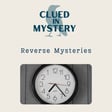
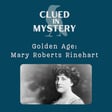
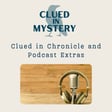
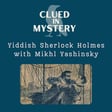
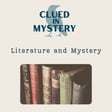
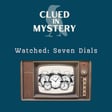
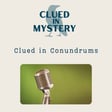
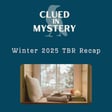
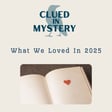
![[Re-release] Anthony Berkeley image](https://media.zencastr.com/cdn-cgi/image/width=112,quality=85/image-files/61e1c276e3ec42007857cff9/e7c778ac-a2ba-4809-9a5c-7cd39d167834.jpg)
![[Bonus] Wake Up Dead Man image](https://media.zencastr.com/cdn-cgi/image/width=112,quality=85/image-files/61e1c276e3ec42007857cff9/e276ac32-e664-464f-956c-7699bdb60aa5.jpg)
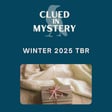
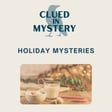
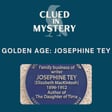
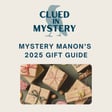
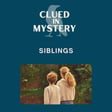

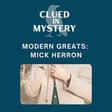
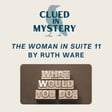
![[Bonus] Read Along: Daughter of Time image](https://media.zencastr.com/cdn-cgi/image/width=112,quality=85/image-files/61e1c276e3ec42007857cff9/b953ad72-c43e-48ca-a18a-b3c216ab90ee.jpg)